Intuitive Eating with Food Allergies or Sensitivies

When learning about intuitive eating you will often hear ‘listen to your body’, ‘make peace with all foods’ and ‘all foods can fit’. These phrases may not resonate if you have food allergies, food intolerances or need to follow a medically-necessary diet. But there are ways in which you can practice and incorporate intuitive eating with food allergies or sensitivities. Brenna breaks it down for you here.

Some of the language used in intuitive eating may make it seem like it’s not something you can do if you have food allergies, intolerances or sensitivities. On top of this, diet culture and people who sell diets have co-opted the language of medically-necessary diets, like those for food allergies. They’ve repackaged them as fad or trend diets (i.e. anyone on a gluten-free diet who doesn’t have an intolerance to gluten, they’re doing this because “gluten-free’ has become a fad diet), which can make you feel like you’re not being taken seriously, when you need to ensure the safety of foods you eat.
But in fact, intuitive eating can work perfectly well even if you have food allergies or sensitivities. In fact, the principles of intuitive eating can be really supportive in helping you create a more peaceful relationship with food – aka not feeling obsessive – while catering to any allergies or intolerances that you may have.
This is something we help clients with and is something that I’ve personally had to navigate as well. Celiac Disease is very common in my family and I’ve adopted a gluten-free diet since early high school. In my own experience, I’ve found that it can be tough to manage the feelings that come from needing to avoid certain ingredients or foods, and pay extra attention to what I’m eating, while also trying not to follow food rules or feel obsessed about what I eat.
Intuitive Eating with Food Allergies: Flexibility is Key
Food allergies can be traumatic and have a lasting impact on your relationship with food and your body. You may have had an allergic reaction, visited many doctors, done multiple tests, felt sick and confused as you teased out what foods were causing your symptoms. All of these experiences can create a disconnect and distrust in your body. Creating a flexible eating environment doesn’t mean making yourself unsafe or ignoring your allergy. Instead, it means liberalizing other areas of your diet to minimize stress and re-establish eating as an enjoyable experience. Having the flexibility to find foods you enjoy that still fit with your dietary needs both keep you safe but also prevents you from feeling too restricted or stressed around food choices and availability.
Step 1: Reframe Your Intention
A helpful place to start is to reframe how you think about your food allergy or dietary restriction. Shift the perspective from a ‘diet’ relating to weight or physical appearance, to whatever reason this food doesn’t feel good or work well with your body. Rather than thinking of it as a rule reminiscent of dieting or restriction, think about it as a choice informed by your experience with this food or knowledge of how this food doesn’t react well in your body.
For example, shift the intention from “because I’m not allowed to have that food” to “I choose foods that make me feel good” which in this case are foods that are free of _______.
Setting this intention behind your way of eating can act as a grounding reminder when you feel challenged by diet culture or diet messaging – you’re working with your body, not against it.
Step 2: Move From Scarcity to Abundance
The messages used around intuitive eating of ‘spend less time thinking about food’ or ‘no food rules’ can feel foreign when you actually do need to pay special attention to what you’re eating. It can also make you feel left out if certain traditional dishes, holiday meals or group gatherings are centered around foods that you need to avoid.
Practice shifting your mindset from scarcity to abundance. Rather than focusing on all the things you can’t have, think about how you can make as many foods as possible available. For example, using food substitutes, introducing friends to your allergen-free options and choosing restaurants that have allergen-friendly dishes. You can also think of it as an opportunity to create new dishes, experiment with substitutes and find foods that are satisfying and nourishing that also fit your needs.
This is where that extra thought and planning around meals can be beneficial and ultimately offer more flexibility and inclusivity.
- Find ways to still have your favorite foods and make safe foods enjoyable. Food allergies are inherently restrictive so allowing yourself to enjoy your favorite foods in an allergen-free version can minimize the feeling of being restricted. Use spices, sauces, or spreads to make your allergen-friendly food taste good, and experiment with different recipes or new products. Free of allergens doesn’t mean your meals need to be free of flavor or satisfaction.
- Food allergies and intolerances are where food substitutes shine! Allowing yourself the flexibility to have and try different substitutes like gluten-free bagels or dairy-free ice creams can help you feel less restricted around food – and remind you that you aren’t on a ‘diet’ you’re choosing foods that feel good for you. Especially in our dieting society this is an important reminder that you’re not avoiding (bagels, pizza, ice cream, nutty desserts), you’re avoiding the allergen but can still enjoy those foods, allergen-free.
Step 3: How to Handle the Increased Food Talk
Another aspect of food allergies/medical diets is that it can increase the talk around food, from friends, strangers, family, etc. If your allergy/intolerance is often found in foods that society deems ‘unhealthy’ you may receive increased comments around why you’re not eating that food or how you’re ‘being so good’ for choosing another option. These comments are unwarranted and can be even more frustrating because they dismiss the intention behind your choices – to choose foods that are enjoyable and safe to you, not to be on ‘another diet’. Here are some more resources and tips on how to handle food and diet talk.
A Few Other Things to Keep in Mind:
1. Allow yourself to have substitutes and fun foods. A gluten-free bagel is not the same as a fresh NY bagel, but ordering one or having them in the freezer so that you can be included when friends or family have bagels with breakfast can make your diet feel less like you’re restricted. This can also help you focus on the people around you rather than the food itself. Keep allergen-free foods in the house, including tasty, satisfying options. Allergen-free doesn’t need to mean boring or bland, you still deserve fun foods just because they taste good. This is where gentle nutrition and #allfoodsfit still applies.
2. Remember that ensuring your food is safe is not annoying or unreasonable. Whether that means asking your server to double-check if a dish is allergen-free, or bringing an extra snack in case what’s served isn’t allergen-safe. Your safety and peace of mind is a priority and should be respected.
Bottom Line: Eating is Individual
It makes sense that one way of eating wouldn’t work for every person. All of our bodies are different – as are our food preferences, access to foods, schedules, culinary skills, etc – regardless of allergies, autoimmune issues, and intolerances. Each of these issues is complex and in terms of figuring out how food can fit into helping with symptom management – there can be an overwhelming amount of information, and unfortunately, many anecdotal suggestions of elimination/restriction.
This can make it tricky to pick apart what is someone’s lived experience of ‘what worked for them’ vs. what might work for you – or be realistic/known to be helpful. Messages with the promise to ‘cure’ or ‘heal’ – this language is sometimes a red flag that a program may be ‘overpromising’. You are the expert of your body but with so many layers to food allergies and intolerances, or with people who have a more complex health history, it can be helpful to have the support of a trained professional.
If you’re interested in working on your relationship with food and your body, and navigating feeling flexible around your food choices, and I specialize in intuitive eating with food allergies and intolerances. Check out my virtual coaching packages for more info.
What questions or tips do you have about intuitive eating with food allergies? Share with me below!
Are you interested in learning more about intuitive eating?
Check out my Unapologetic Eating 101 Course, an online, self-paced program to liberate yourself from dieting and make peace with food and your body.
My team and I also offer virtual one-on-one support – you can check out our virtual intuitive eating nutrition coaching packages.
My book, Unapologetic Eating: Make Peace with Food and Transform Your Life, is also a great resource that includes information, research, and reflection prompts to help you move away from dieting and come back home to your body, so you can live your most unapologetic, liberated life.
Author Bio
This article was written and reviewed by Alissa Rumsey, MS, RD, CSCS, a registered dietitian and Certified Intuitive Eating Counselor. She specializes in weight-inclusive care, intuitive eating, body image healing, mindfulness, self-compassion, and healing from chronic dieting, disordered eating, and eating disorders. Alissa holds a Bachelor’s Degree in Nutrition and Exercise Science, and a Master’s Degree in Health Communications, and is also an NSCA Certified Strength and Conditioning Specialist.
15 Comments
Leave a Comment
share the love
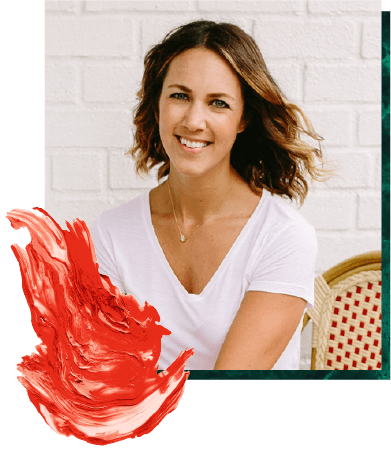
about
Alissa Rumsey, RD.
Alissa Rumsey, MS, RD, CDN, CSCS (pronouns she/her/hers) is a registered
dietitian, nutrition therapist, certified intuitive eating counselor, and the author of
Unapologetic Eating: Make Peace With Food and Transform Your Life. Alissa is
passionate about helping people reclaim the space to eat and live,
unapologetically.
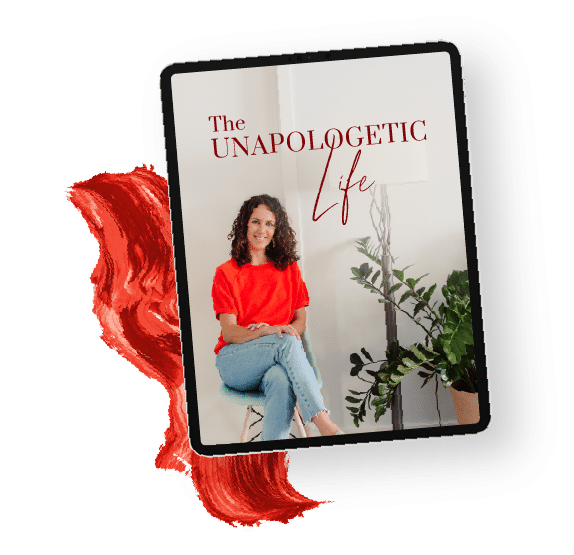
A twice-a-month round-up of inspirational stories, lessons, practical tips and encouragement for living your most authentic, unapologetic life.
The Unapologetic Life
RECENT POSTS
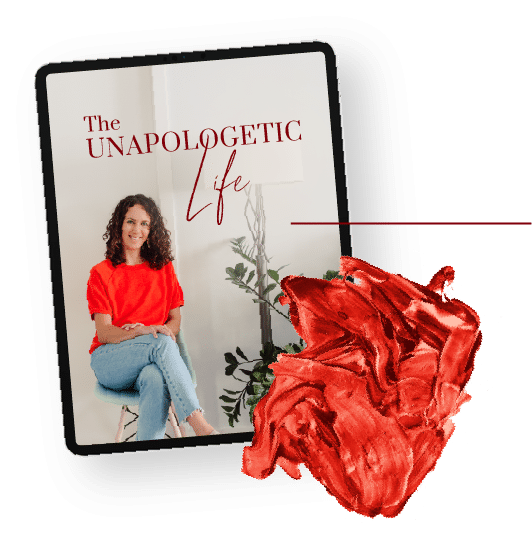
The Unapologetic Life
A twice-a-month round-up of inspirational stories, lessons, practical tips and encouragement for living your most authentic, unapologetic life.






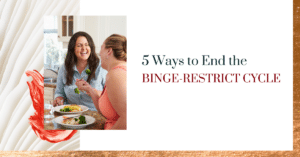
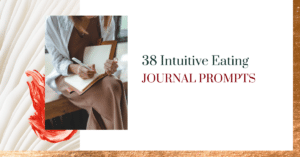
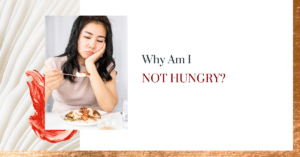
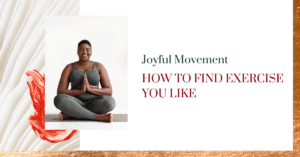

This is really helpful!! I recently learned I have 2 conditions that are fed/exacerbated by estrogen dominance (endometriosis and uterine fobroids), and I want to start removing foods that might contribute to my pain. The challenge is that xenoestrogens are literally in everything, and by cutting out foods that may be harmful I’m essentially left with organic fish and vegetables and fruit. Can you recommend any resources on IE with an EXTREMELY restricted diet? It frustrates me because literally EVERYTHING I eat normally is potentially harmful to me, handball the foods that are apparently supposed to be good for my conditions are foods I’m just not interested in. I don’t know how to reconcile these things.
Hi Andrea, I’m happy to hear this was helpful! I’m so sorry to hear of your conditions, this sounds so frustrating and a really tough spot to be in. I don’t know of any specific resources online, however I’d highly recommend working with a registered dietitian who specializes in IE/food sensitivities, as it’s going to be a fine line between restricting your diet too much / removing the foods that are contributing to your pain. Best of luck with this!
I am just discovering intuitive eating. I am also gluten, dairy, soy, legume, oat,and egg sensitive. Some of them cause gastrointestinal problems. Others trigger my RA. I also have realized that I don’t tolerate fatty foods well. I don’t have a gallbladder and don’t digest them well. I get nauseous when I eat them. I used to have high cholesterol and blood sugar and high blood pressure. A low-fat diet resolved all of those issues. I am struggling because I also used a low-fat diet to attempt to lose weight. I am struggling to separate the two. Any advice?
Hi Liz, it can be tough to separate the two out when there is that history of dieting for weight loss. A lot will come from the intention behind the eating and teasing this out. I’m unable to give specific advice given your medical history, however gentle nutrition may also help, you can read more about this here: https://alissarumsey.com/intuitive-eating/gentle-nutrition/ and https://alissarumsey.com/intuitive-eating/gentle-nutrition-intuitive-eating/. I would recommend working with a dietitian who specializes in intuitive eating for medical conditions to help work through this with you. We offer this service, or you can find someone on https://www.intuitiveeating.org/certified-counselors/. Best of luck!
I really appreciate this post. It helps to understand how to cope with limitations while respecting your body. Further to this point, I am wondering how to make peace with all foods yet make ethical choices about not supporting Big Food companies that have a history of oppression and human rights violations. How do you bridge these two choices? How do you discern if these ethical decisions are part of your restrictive eating patterns versus true ethical choices? How do you educate clients about this congruently with Intuitive Eating without venturing down the path of healthism or recreating restrictive eating patterns? Is it part of gentle nutrition further down the road? I’m struggling to reconcile the two and would love to hear your insight.
Hi there, this is such a great question and one that doesn’t have an easy, pat answer. I’d do some more exploring about your food decisions – it’s likely that there is both some ethical components as well as restrictive eating components, so try to tease this out as much as possible. Another resource to check out is Taylor Wolfram, as she talks about this (from a vegan standpoint often, but I think it may resonate): http://www.taylorwolfram.com.
Alissa,
Thank you so much for sharing this information! I am just starting IE and I was worried about my gluten and dairy intolerance but you cleared things up for me!! I know now that I can still eat the right foods for me and still listen to what my body needs!
Hi Donna, you’re welcome – I’m happy this was helpful for you!
Thanks for this! Exactly what I was looking for, I have EOE and started to notice how much stress food was bringing me. So this gave me a new perspective and way to move forward with eating.
I’m so happy it was helpful Lindsay!
Hi! Fellow celiac here. I wasn’t diagnosed with celiac until my freshman year of college. Since then I’ve always dealt with issues of food insecurity (fear of going hungry so I end up overcompensating if I’m in a non-planned food environment like traveling). Before the diagnosis, I never thought about what I ate (the last time I truly ate intuitively). I’m working my way back to that point but it’s so tough. Thanks for the post!
Thanks for being here and sharing Leigh!
This is such a great article! I have recently found that I am salycilate sensitive and I have to be gluten free. If I have to many salycilates it causes my blood sugar to go wonky and my ADHD is horrible, and I get sick easily. But the problem is that I love to eat all the things I really can’t eat and it makes me sad. I love my fruits and veggies and herbs and spices, but now I feel limited because I can’t have many of those things. I have food cravings badly too. The things I am grateful for is that I can have chocolate, cheeses, and sugar, meats and beans hahaha….but I really love spicy foods and international foods, and curries. Which I can’t have much of really. So help, I have done all sorts of diets to lose weight and to fix my health problems. Now that I know what my actual problems are, I feel bummed.
Any ideas? I would really appreciate it!!
Thank you so much for this article…I am new to this journey and I really want to change.
Hi there, I’m legally/ethically unable to give specific medical nutrition therapy advice to folks I’m not working with as a client. I’d highly recommend reaching out to a dietitian who specializes in food allergies/sensitivities for help with this.
Hello! This is really helpful to me as I started my intuitive eating journey this past August. But I am finding myself struggling with inflammation (in my upper middle back). I can tell that because my body has been very achy. And so anyways this article is very helpful because I have felt stuck in not wanting to get triggered by the diet mentality but also take care of my body and also feel freedom in the foods I eat. I did eat Keto for 10 months around a year ago, and I did genuinely enjoy it and felt freedom in it. But after 10 months I did not desire to do it at all and found intuitive eating which definitely has felt very freeing and grounding, but now my body has been hurting from certain foods I’m eating that cause inflammation.